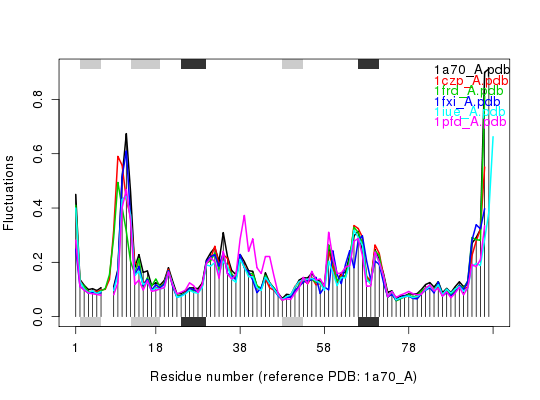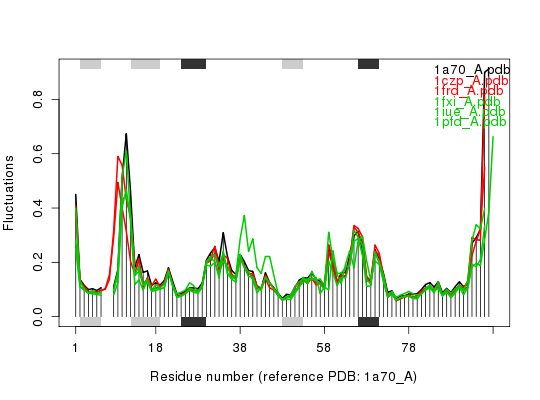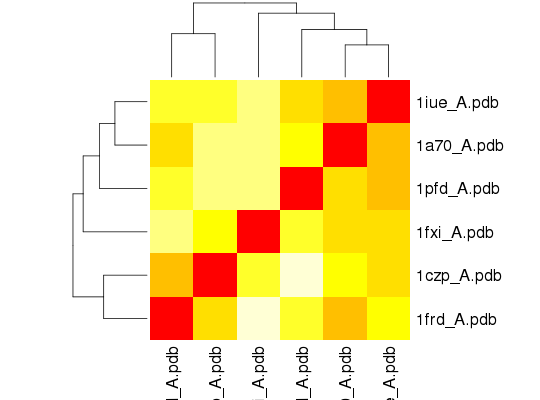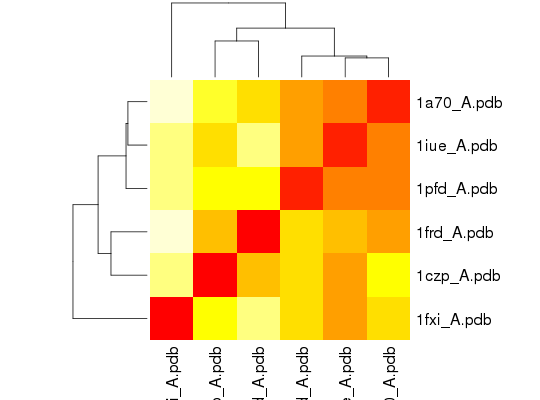Ensemble Normal Mode Analysis
Usage
"nma"(pdbs, fit = TRUE, full = FALSE, subspace = NULL, rm.gaps = TRUE, varweight=FALSE, outpath = NULL, ncore = 1, ...)"print"(x, ...)
Arguments
- pdbs
- a numeric matrix of aligned C-alpha xyz Cartesian
coordinates. For example an alignment data structure obtained with
read.fasta.pdborpdbaln. - fit
- logical, if TRUE coordinate superposition is performed prior to normal mode calculations.
- full
- logical, if TRUE return the complete, full structure, ‘nma’ objects.
- subspace
- number of eigenvectors to store for further analysis.
- rm.gaps
- logical, if TRUE obtain the hessian matrices for only atoms in the aligned positions (non-gap positions in all aligned structures). Thus, gap positions are removed from output.
- varweight
- logical, if TRUE perform weighing of the pair force
constants. Alternatively, provide a NxN matrix containing the
weights. See function
var.xyz. - outpath
- character string specifing the output directory to which the PDB structures should be written.
- ncore
- number of CPU cores used to do the calculation.
ncore>1requires package ‘parallel’ installed. - x
- an
enmaobject obtained fromnma.pdbs. - ...
- additional arguments to
nma,aa2mass, andprint.
Description
Perform normal mode analysis (NMA) on an ensemble of aligned protein structures.
Details
This function performs normal mode analysis (NMA) on a set of aligned
protein structures obtained with function read.fasta.pdb or
pdbaln. The main purpose is to provide aligned atomic
fluctuations and mode vectors in an automated fashion.
The normal modes are calculated on the full structures as provided by object ‘pdbs’. With the input argument ‘full=TRUE’ the full ‘nma’ objects are returned together with output ‘U.subs’ providing the aligned mode vectors. When ‘rm.gaps=TRUE’ the unaligned atoms are ommited from output. With default arguments ‘rmsip’ provides RMSIP values for all pairwise structures.
See examples for more details.
Value
-
Returns an ‘enma’ object with the following components:
- fluctuations
- a numeric matrix containing aligned atomic fluctuations with one row per input structure.
- rmsip
- a numeric matrix of pair wise RMSIP values (only the ten lowest frequency modes are included in the calculation).
- U.subspace
- a three-dimensional array with aligned eigenvectors (corresponding to the subspace defined by the first N non-trivial eigenvectors (‘U’) of the ‘nma’ object).
- L
- numeric matrix containing the raw eigenvalues with one row per input structure.
- xyz
- an object of class ‘xyz’ containing the Cartesian
coordinates in which the calculation was performed. Coordinates are
superimposed to the first structure of the
pdbsobject when ‘fit=TRUE’. - full.nma
- a list with a
nmaobject for each input structure.
References
Skjaerven, L. et al. (2014) BMC Bioinformatics 15, 399. Grant, B.J. et al. (2006) Bioinformatics 22, 2695--2696.
Examples
# Needs MUSCLE installed - testing excluded ## Fetch PDB files and split to chain A only PDB files ids <- c("1a70_A", "1czp_A", "1frd_A", "1fxi_A", "1iue_A", "1pfd_A") files <- get.pdb(ids, split = TRUE, path = tempdir())|======================================================================| 100%## Sequence Alignement pdbs <- pdbaln(files, outfile = tempfile())Reading PDB files: /tmp/RtmpTDihxb/split_chain/1a70_A.pdb /tmp/RtmpTDihxb/split_chain/1czp_A.pdb /tmp/RtmpTDihxb/split_chain/1frd_A.pdb /tmp/RtmpTDihxb/split_chain/1fxi_A.pdb /tmp/RtmpTDihxb/split_chain/1iue_A.pdb /tmp/RtmpTDihxb/split_chain/1pfd_A.pdb . PDB has ALT records, taking A only, rm.alt=TRUE ..... Extracting sequences pdb/seq: 1 name: /tmp/RtmpTDihxb/split_chain/1a70_A.pdb pdb/seq: 2 name: /tmp/RtmpTDihxb/split_chain/1czp_A.pdb PDB has ALT records, taking A only, rm.alt=TRUE pdb/seq: 3 name: /tmp/RtmpTDihxb/split_chain/1frd_A.pdb pdb/seq: 4 name: /tmp/RtmpTDihxb/split_chain/1fxi_A.pdb pdb/seq: 5 name: /tmp/RtmpTDihxb/split_chain/1iue_A.pdb pdb/seq: 6 name: /tmp/RtmpTDihxb/split_chain/1pfd_A.pdb## Normal mode analysis on aligned data modes <- nma(pdbs, rm.gaps=FALSE)Details of Scheduled Calculation: ... 6 input structures ... storing 282 eigenvectors for each structure ... dimension of x$U.subspace: ( 300x282x6 ) ... coordinate superposition prior to NM calculation ... estimated memory usage of final 'eNMA' object: 3.9 Mb |======================================================================| 100%## Plot fluctuation data plot(modes, pdbs=pdbs)Extracting SSE from pdbs$sse attribute## Cluster on Fluctuation similariy sip <- sip(modes)
hc <- hclust(dist(sip)) col <- cutree(hc, k=3) ## Plot fluctuation data plot(modes, pdbs=pdbs, col=col)Extracting SSE from pdbs$sse attribute
## Remove gaps from output modes <- nma(pdbs, rm.gaps=TRUE)Details of Scheduled Calculation: ... 6 input structures ... storing 282 eigenvectors for each structure ... dimension of x$U.subspace: ( 288x282x6 ) ... coordinate superposition prior to NM calculation ... aligned eigenvectors (gap containing positions removed) ... estimated memory usage of final 'eNMA' object: 3.7 Mb |======================================================================| 100%## RMSIP is pre-calculated heatmap(1-modes$rmsip)
## Bhattacharyya coefficient bc <- bhattacharyya(modes)Calculating covariance matrices Calculating pairwise bhattacharyya coefsheatmap(1-bc)
See also
For normal mode analysis on single structure PDB:nma.pdb
For the analysis of the resulting ‘eNMA’ object:
mktrj.enma, dccm.enma,
plot.enma, cov.enma.
Similarity measures:
sip, covsoverlap,
bhattacharyya, rmsip.
Related functionality:
pdbaln, read.fasta.pdb.



